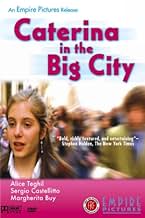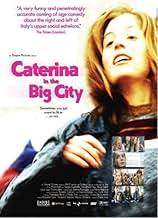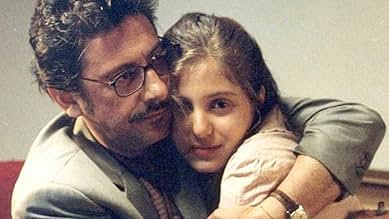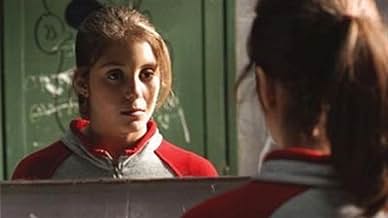PUNTUACIÓN EN IMDb
6,8/10
3,3 mil
TU PUNTUACIÓN
Añade un argumento en tu idiomaCaterina, forced to leave her small town at the age of thirteen, faces the complications of living in the big metropoly of Rome.Caterina, forced to leave her small town at the age of thirteen, faces the complications of living in the big metropoly of Rome.Caterina, forced to leave her small town at the age of thirteen, faces the complications of living in the big metropoly of Rome.
- Dirección
- Guión
- Reparto principal
- Premios
- 7 premios y 9 nominaciones en total
Zach Wallen
- Edward
- (as Zach -James Smith- Wallen)
Margerita Mazzola
- Martina
- (as Margherita Mazzola)
Martina Tasquetta
- Alessia
- (as Martina Taschetta)
Giulia Gorietti
- Giada
- (as Giulia Elettra Gorietti)
Reseñas destacadas
10Andy-296
This excellent Italian comedy is very similar in plot to Mean Girls (who came out in about the same time). The difference is that this is a much more politicized film. Caterina is a shy teenager from a small town in Italy, who moves to Rome with her long-suffering mother and her teacher father, when he is assigned to a new job there. In her new school, she has to choose to what clique to belong: the children of the progressive intellectuals or the children of the rich industrialists. The left or the right. What this film says is that these people are not terribly different between themselves. They both hold a degree of fame and power in Italian society, and look down upon those who don't. The outstanding performance in the movie is that of Caterina's father, the teacher Giancarlo (Sergio Castellito), a hothead angry that others have gotten all the breaks in life, who rants against the rich and privileged but who would sell his soul in a second in order to join the establishment. He is a familiar type of malcontent in real life but one who is seldom shown in the movies. There is a silly subplot of Caterina falling in love with an Australian boy (What they did that for? To reach an international market?), but all in all, this is one of the best Italian movies of the last years.
I think Virzì is one of the most interesting director in Italy, at the present moment. His ability to portray the current Italian society is quite good, and he achieves this either with *characters* (the two families in "Ferie d'Agosto", the father in "Caterina va in città") and with *stories* (the story of "Ovosodo", a bit of an Italian "It's a wonderful life"... just a bit, obviously... :-).
"Caterina va in città" is a good movie: the idea of showing chunks of the Italian society and habits through the eyes of an innocent teenager gives the movie a "fairy tale" twist that makes it really "light" and enjoyable. I also liked the mom's character, played by a really good and beautiful Margherita Buy: in general, I appreciated Virzì's idea that the "good" part of society is based on the strength of women, as all male characters in this movie either are donquixotesque losers or spoiled and arrogant over-grown babies.
But, as for most of his movies, I think the same criticism again apply: Virzì is openly a left-wing director, but he stresses this a bit too much and sometimes its works sound too "ideological": art should make you think, not tell you what to think, I guess. In addiction, some characters are too stereotypical and don't come out of a really deep psychological analysis. Still, I think he is currently the director who knows best how to take on the screen what goes on in Italy.
In conclusion, I think this movie - just like "Ovosodo" - is based on a simple yet powerful assumption: that happiness is the disease of the idiots...
"Caterina va in città" is a good movie: the idea of showing chunks of the Italian society and habits through the eyes of an innocent teenager gives the movie a "fairy tale" twist that makes it really "light" and enjoyable. I also liked the mom's character, played by a really good and beautiful Margherita Buy: in general, I appreciated Virzì's idea that the "good" part of society is based on the strength of women, as all male characters in this movie either are donquixotesque losers or spoiled and arrogant over-grown babies.
But, as for most of his movies, I think the same criticism again apply: Virzì is openly a left-wing director, but he stresses this a bit too much and sometimes its works sound too "ideological": art should make you think, not tell you what to think, I guess. In addiction, some characters are too stereotypical and don't come out of a really deep psychological analysis. Still, I think he is currently the director who knows best how to take on the screen what goes on in Italy.
In conclusion, I think this movie - just like "Ovosodo" - is based on a simple yet powerful assumption: that happiness is the disease of the idiots...
"Caterina va in città" seems like your typical teen film. It somehow reminds me of "Thirteen", but it goes a little deeper than the average American teen film.
In American teen films the parents are normally reduced to simple shadows that serve more as a background for their sons and daughters' lives - they are either of the preaching-repressive sort, or the tolerant, ever-forgiving parents, that eventually through love will help their children to the way of redemption.
Not so, "Caterina va in città". In this film, not just Caterina ( Alice Teghil) but her parents as well are portrayed as three-dimensional human beings and this makes the film more interesting.
Caterina and her parents move from a small Italian town to Rome. And there Caterina's life will be shaken. She goes to high school and meets new friends - many new things happen in her life. She feels uprooted from her old self, and doesn't know anymore who she really is.
One can say that "Caterina va in città" is a coming of age film - it portrays her search for her place in the world - many American teen films tell the same story. But what differentiates this film from its American counterparts is the attention it gives to the parents. The father Giancarlo (Sergio Castellito) is a deeply disturbed personality. He thinks the world revolves around him and there's a conspiracy of important segments of society whose main aim is preventing him from succeeding in life. He is an egoist that treats his wife as a dumb servant and his daughter as a beautiful puppy. But no, he's not a "bad" man - in his own distorted way he loves his wife and his daughter. Sergio Castellito gives us a stellar interpretation as the problematic father, underlining his pathetic and quixotic traits. Agata (Margherita Buy), is his ever-enduring wife - she has a deeper layer than it may appear at first glance. And there's Caterina living with them, seeing them with her innocent eyes.
The other characters in the film are what one could call walking clichés. Nothing that has not been shown before in American teen movies. Politics shows its colors in the film, but in a very superficial way. It's not really essential for the film's story - left and right could have been easily substituted for rival football teams.
The ending (difficult to imagine in American films) will come as a surprise and have a liberating effect on the viewer. All in all, "Caterina va in città" is a good teen film thats stands a bit above the usual film of the genre.
In American teen films the parents are normally reduced to simple shadows that serve more as a background for their sons and daughters' lives - they are either of the preaching-repressive sort, or the tolerant, ever-forgiving parents, that eventually through love will help their children to the way of redemption.
Not so, "Caterina va in città". In this film, not just Caterina ( Alice Teghil) but her parents as well are portrayed as three-dimensional human beings and this makes the film more interesting.
Caterina and her parents move from a small Italian town to Rome. And there Caterina's life will be shaken. She goes to high school and meets new friends - many new things happen in her life. She feels uprooted from her old self, and doesn't know anymore who she really is.
One can say that "Caterina va in città" is a coming of age film - it portrays her search for her place in the world - many American teen films tell the same story. But what differentiates this film from its American counterparts is the attention it gives to the parents. The father Giancarlo (Sergio Castellito) is a deeply disturbed personality. He thinks the world revolves around him and there's a conspiracy of important segments of society whose main aim is preventing him from succeeding in life. He is an egoist that treats his wife as a dumb servant and his daughter as a beautiful puppy. But no, he's not a "bad" man - in his own distorted way he loves his wife and his daughter. Sergio Castellito gives us a stellar interpretation as the problematic father, underlining his pathetic and quixotic traits. Agata (Margherita Buy), is his ever-enduring wife - she has a deeper layer than it may appear at first glance. And there's Caterina living with them, seeing them with her innocent eyes.
The other characters in the film are what one could call walking clichés. Nothing that has not been shown before in American teen movies. Politics shows its colors in the film, but in a very superficial way. It's not really essential for the film's story - left and right could have been easily substituted for rival football teams.
The ending (difficult to imagine in American films) will come as a surprise and have a liberating effect on the viewer. All in all, "Caterina va in città" is a good teen film thats stands a bit above the usual film of the genre.
Caterina gives us an opportunity to feel and a chance to hope. A young girl both naive and somehow mature, she is unsure of what she wants in life. Her task is learning to navigate the waters of a high school in Rome where she is the new girl from the sticks when her father is transfered from a small town on the coast. He fulfills his dream of returning to the cultural mecca of the capital where he hopes to take his "rightful" place among the intelligentsia. But the film turns on just this point"rightful place". There are no simple answers, though we do have an opportunity to see how complex it is to find one's place, rightful or not, in the world. Caterina is something of a metaphor for the Italian populace at large, I would think. But she is more than this. There is something about her story that touched me, several decades and half a world away from the world she inhabits, a world stratified by cliques and patronage, prejudice and injustice...a world very much like the one I live in and the one I imagine most of us live in. Caterinaas the film that bears her namedoes not take the easy way out in running away or self-repression or living a life of quiet desperation, even when her sheltered provincial upbringing and less-than-ideal family situation do not give her any clues on how to deal with her new life and classmates from prominent families. She tries to adjust to the fast-pace and superficiality of life in the Italian capital, and much of the fun of the movie is seeing her in the various situations she encounters along the way. Her father is great as the frustrated writer with no talent and a loud voice, a self-important boor. My heart goes out to all the Caterinas of the world, who go forward with optimism and pure heart even when they know the odds are against them.
'Caterina va in citta' ('Caterina in the Big City') is an Italian film that takes as its storyline the coming of age of a young teenager transported by her family from the quiet Tuscany seaside village of Montaldo Di Castro to the challenging realities of Big City Rome, but that is only the means to an end of exploring Italian politico-social life and its effects on the youth of today. It comes very close to drowning in its own excesses, but at the root of the film is a sensitive tale of a young girl's struggles with growing into an adulthood that puzzles, frightens and challenges her.
Caterina (Alice Teghil) finds her greatest moments of happiness in her home town singing mezzo soprano in the choir: simple pleasures in a simple setting surrounded by country folk content to live life day to day. Her father Giancarlo (Sergio Castellitto) is a teacher who can't hold a job, partially because he is so outspoken and partially because he is a raving truly obnoxious person. Her mother Agata (Margherita Buy) is subservient, a woman with few coping mechanisms who allows her odious husband to run an abusive household. Giancarlo's aunt is ill in Rome and with the idea of finding a job where his talents are respected, Giancarlo uproots his little family and moves to the big city. There the social castes are evident and Caterina is judged a country hick until she is befriended by first a rebel who bonds with Caterina, introduces her to tattoos and liquor, and causes a schism between her important mother (Giancarlo hoped to have is novel published by the woman), the daughter and his family. Caterina then is absorbed into the rich and spoiled rank and file of the wealthy, not fitting in until the girls do a make over. That situation is again disrupted by Giancarlo's blindly inappropriate behavior. The true Caterina is somehow lost, still dreaming of becoming a fine mezzo soprano, but tagging along with the crowd du jour. Ultimately Giancarlo's multiple and consistent failures drive him away from the family, he rides off to oblivion on his restored motorbike, and Agata and Caterina both bloom.
The noise level of this film is such that it is difficult to watch: the young girls means of communication is a mixture of screaming, loud talking, and fighting and otherwise making us uncomfortable. Yet underneath all of the political and social expose and brandishing is a truly wonderful young Caterina whose life as a soap opera is watched tenderly by an Australian boy who plays the guitar and observes her family from a window across the way from Caterina's Rome home. The moments toward the end of the film when the playback comes justifies the fuss of getting there.
This is not a film this viewer would sit through again, but reflecting on the story after all the commotion is over, hearing Mozart's 'Ave Verum Corpus' and Verdi's 'Nabucco" etc as the inspiration behind Caterina's honest dreams, makes is a more memorable experience. In Italian with English subtitles. Grady Harp
Caterina (Alice Teghil) finds her greatest moments of happiness in her home town singing mezzo soprano in the choir: simple pleasures in a simple setting surrounded by country folk content to live life day to day. Her father Giancarlo (Sergio Castellitto) is a teacher who can't hold a job, partially because he is so outspoken and partially because he is a raving truly obnoxious person. Her mother Agata (Margherita Buy) is subservient, a woman with few coping mechanisms who allows her odious husband to run an abusive household. Giancarlo's aunt is ill in Rome and with the idea of finding a job where his talents are respected, Giancarlo uproots his little family and moves to the big city. There the social castes are evident and Caterina is judged a country hick until she is befriended by first a rebel who bonds with Caterina, introduces her to tattoos and liquor, and causes a schism between her important mother (Giancarlo hoped to have is novel published by the woman), the daughter and his family. Caterina then is absorbed into the rich and spoiled rank and file of the wealthy, not fitting in until the girls do a make over. That situation is again disrupted by Giancarlo's blindly inappropriate behavior. The true Caterina is somehow lost, still dreaming of becoming a fine mezzo soprano, but tagging along with the crowd du jour. Ultimately Giancarlo's multiple and consistent failures drive him away from the family, he rides off to oblivion on his restored motorbike, and Agata and Caterina both bloom.
The noise level of this film is such that it is difficult to watch: the young girls means of communication is a mixture of screaming, loud talking, and fighting and otherwise making us uncomfortable. Yet underneath all of the political and social expose and brandishing is a truly wonderful young Caterina whose life as a soap opera is watched tenderly by an Australian boy who plays the guitar and observes her family from a window across the way from Caterina's Rome home. The moments toward the end of the film when the playback comes justifies the fuss of getting there.
This is not a film this viewer would sit through again, but reflecting on the story after all the commotion is over, hearing Mozart's 'Ave Verum Corpus' and Verdi's 'Nabucco" etc as the inspiration behind Caterina's honest dreams, makes is a more memorable experience. In Italian with English subtitles. Grady Harp
¿Sabías que...?
- CuriosidadesSara Pallini's debut.
- PifiasThe story begins in 2003, but the dates do not match up with the days of the week for that year.
- ConexionesReferences Granujas a todo ritmo (The Blues Brothers) (1980)
- Banda sonoraInno ufficiale dei giovani fascisti
Music by Giuseppe Blanc and lyrics by Vittorio E. Bravetta
Sung at the wedding reception
Selecciones populares
Inicia sesión para calificar y añadir a tu lista para recibir recomendaciones personalizadas
- How long is Caterina in the Big City?Con tecnología de Alexa
Detalles
Taquilla
- Recaudación en Estados Unidos y Canadá
- 296.464 US$
- Fin de semana de estreno en EE. UU. y Canadá
- 9352 US$
- 5 jun 2005
- Recaudación en todo el mundo
- 4.407.426 US$
- Duración1 hora 47 minutos
- Color
- Mezcla de sonido
- Relación de aspecto
- 2.35 : 1
Contribuir a esta página
Sugerir un cambio o añadir el contenido que falta

Principal laguna de datos
By what name was Caterina se va a Roma (2003) officially released in Canada in English?
Responde









